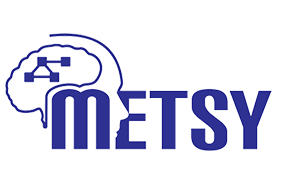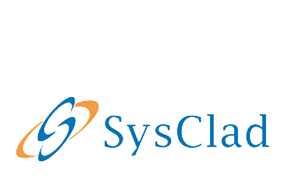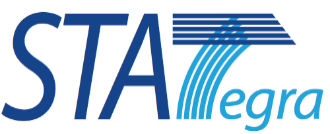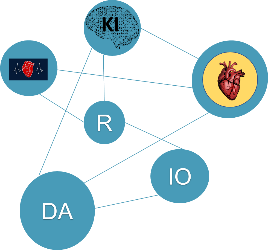Systems Medicine
improving health
Systems Medicine combines systematic assessment of complex biopsychosocial information at multiple scales of life to improve our understanding of health and disease and actually deliver improved, personalised prevention and care.
Learn more
Systems Medicine combines systematic assessment of complex biopsychosocial information at multiple scales of life – from social networks to organ imaging and molecular “omics” data – with predictive computational modelling – from “black-box” AI machine learning to mechanistic models – to improve our understanding of health and disease and actually deliver improved, personalised prevention and care.
Systems Medicine provides a paradigm shift from parts-oriented reductionism to process-oriented holism developing a valid causal theory of how ‘bio’, ‘psycho’ and ‘socio’ actually relate.
Delivering on this conceptual progress for improved prevention and care will require similar paradigm shifts in the organisation of healthcare and public health, a task LabVantage-Biomax is actively involved in in many translational medicine projects (see Research Area “Clinical”).
Our projects
EU and national research projects
LabVantage-Biomax contributes to the Systems Medicine approach in almost 20 previous and ongoing large scale EU and national research projects from cancer to allergic, infectious, mental and respiratory disease.
(see also Research Area “Neurological Disorders”)
We provide secure and sustainable infrastructure that semantically integrates
Areas and projects

















( Click on a project to learn more )
Our contribution
Our contribution
For a clinician the availability of detailed, holistic information about a patient is overwhelming and requires computational support. At the same time research in Systems Medicine requires multi-disciplinary collaboration to accumulate and make sense of the required diversity of information. This accumulation of complex data on multiple levels and the need for integrative analysis, computational modelling and decision supporting delivery into clinical practice brings exciting novel opportunities and challenges for IT-infrastructures.
One challenge on the technological side is to provide semantic, syntactic and technical interoperability of data, data bases, analytical and simulation software. At the same time the results these tools provide need to be combined into a graphical user interfaces that enable scientist, clinical researchers and clinicians to distil the integrated information into actionable knowledge and make use of it.
LabVantage-Biomax provides the BioXM™ Knowledge Management Environment in Systems Medicine projects to integrate existing knowledge as dense graph, identify context specific layers and sub-graphs and map complex clinical, molecular (multi-omics), imaging and environmental data to generate dedicated knowledge bases for analysis and computational modelling.
Publically available examples are the Respiratory Knowledge Base and the Zika Knowledge Base.
In addition to knowledge and data integration BioXM provides the technical interoperability to enable experts for data analysis and computational modelling to programmatically access and use the integrated knowledge and data. Often multiple tools and models require semantic mapping to enable integrated workflows of analysis and simulation. Finally, to reach the purpose of Systems Medicine and provide actionable knowledge for better decisions a graphical user interface needs to be developed which delivers decision support into clinical or public health practice.
In particular, LabVantage-Biomax contributes to the research projects with the following:
Knowledge management
Standards and certifications
Supporting clinical research privacy tasks
(GDPR, ISO 9001, ISO 27001)
LabVantage-Biomax is ISO 9001 and ISO 27001 certified and applies the corresponding procedures of quality management and IT-security. The NeuroXMTM Brain Science Suite provides encrypted data transfer, authentication, detailed access control based on resources and roles and full audit.
All technological and organisational measures required by the GDPR are implemented.
GDPR compatible data processing agreement templates are available and corresponding contracts have been approved by company and clinical data protection officers in major European countries.
The ISO 9001 based quality management ensures consistence between specification and reported result, including reviews of requirements and technical specifications, software implementation and documentation.
Quality assessment according to ISO 29119 includes unit, integration, regression and acceptance testing.
Fair data
Ensuring FAIR data
from experimental to computational

Scientific background
Scientific Background
In Systems Medicine negative effects on health are seen as result of the interaction type and dynamic of psycho, socio and somatic networks.
Therefore diagnosis and treatment need to systematically take into account factors on all these levels, from molecular omics to physiome and diseasome, which requires the active participation of patients, their close social environment and a multi-disciplinary healthcare team.
As changes to interactions within complex networks give rise to non-deterministic overall effects with typical chaotic effects such as attractors, boundary effects, phase transitions and tipping points, the formalisation of mechanistic hypotheses into computational predictive models.
From asthma and atopic dermatitis through cancer, COPD, depression, infectious disease, intensive care, lung transplantation and rhinitis to schizophrenia and sleep disorders a multitude of diseases and indications have been tackled in the Systems Medicine projects LabVantage-Biomax is or has been involved.
Publications
Back to top
